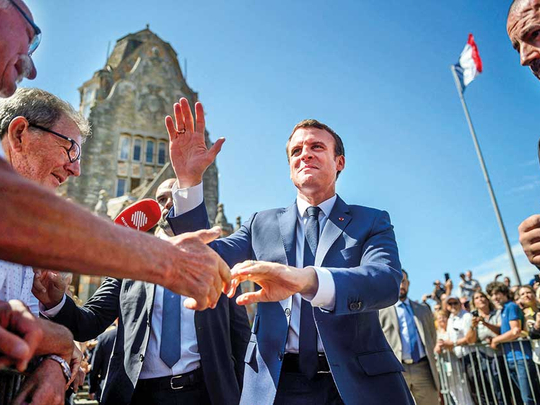
London: The polling stations have closed, the counters have totted up all the votes, Theresa May is hamstrung while Emmanuel Macron celebrates, but one thing seems clear from the UK and French elections of the last week — that the far-right is on the wane.
Nationalist, anti-immigration, anti-EU parties such as Ukip in Britain and the Front National (FN) in France have been shunned by voters, who instead flocked to centrist and left-leaning candidates as they reject the right-wingers’ populist ideals.
That would be the easy conclusion to jump to, but is the reality really that straightforward? Is a soft Brexit guaranteed now that May is having to water down her hard-line policies in light of the Conservatives’ poor performance? Will the incredibly successful Macron and Germany’s Angela Merkel, who is expected to win a fourth term as Chancellor in September, be given free rein to bring about a stronger, closer European Union?
We may have witnessed the first small steps, but Europe is still a long way from rejecting the far-right and its ideas for good, according to political analysts.
Matthew Feldman, professor in contemporary history at Teesside University and an expert on the far-right, believes the movement is now fragmented — but still dangerous and definitely not finished.
“Certainly we saw groups that have been associated with the far right in Britain, for example Ukip, seeing their vote share plummet in the election. But rather than that being down to a wider far-right receding, it might just be that people in Britain thought that Brexit had been delivered, therefore there was no need for them [Ukip] to do anything else,” he told Gulf News.
“The one with France I think is a little more curious. In a sense, we can see it as a success against far-right forces, but Marine Le Pen still received three times more votes than her father [Jean-Marie] did when he made the [presidential] election run-off in 2002.
“But that’s only one narration of the far-right. As we saw on Sunday, 1,000 people can still get on the streets of Manchester for the EDL, so street movements are obviously the most extremist type. If you think of the assassin of Jo Cox MP [Thomas Mair], Pavlo Lapshyn, Anders Behring Breivik, solo actor terrorists are obviously a concern.
“I think it’s a more fragmented far-right — that would be the way I would express it.”
Looking to the future of the EU following the votes in the UK and France, Feldman added it was unlikely there would be a major shift in the near future — at least not until after Brexit negotiations are complete.
“I think there’s a case to be made that Britain has always been one foot in, one foot out of the EU,” he said. “And it may very well be that now the party that was raising objections is out, that may lead to increased movement toward political union.
“Although I don’t think that’s going to be any time soon, certainly not before Britain leaves the EU. I think that’s a longer-term prospect, but I wouldn’t be surprised if Brexit engendered closer collaborations among the remaining countries of the EU.”
There was a warning, however, that not even Macron’s victory and the poor performance of the FN in France will offer any guarantees of a closer union in Europe.
“The situation is complicated. The structural trends that might eventually lead to European disintegration are still intact and show no sign of changing direction,” wrote Brunello Rosa, Chatham House contributor and honorary research fellow at City, University of London.
“These trends are: the progressive impoverishment of southern eurozone countries, an expected increase in migration from Middle Eastern and North African countries, and Britain will leave the European Union.
“In this context, the pressure from Russia on all European countries will continue and probably intensify, while the United States under Donald Trump is likely to diminish the strength and role of Nato in Europe. Even if Macron proves ineffective in domestic policy, he is not likely to have the political stamina to reverse these very well-established trends.
“The biggest threat to Europe currently does not come from the rise of populist parties, which has temporarily slowed, but rather from the possible inaction or ineffectiveness of leaders who are likely to be all pro-European for at least another four or five years. The future of Europe is in their hands.
“If they fail to deliver, the process of disintegration will continue and intensify, with the eventual outcome of a European continent not organised in concentric circles but rather characterised by the presence of clusters of countries with diverging geopolitical goals.”
So while some may see the results of the last few days as a turning point for Europe’s moderates in their battle to keep the far-right out of power, there is still a long road ahead.
— The writer is a freelance journalist based in the UK












